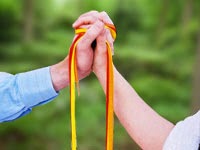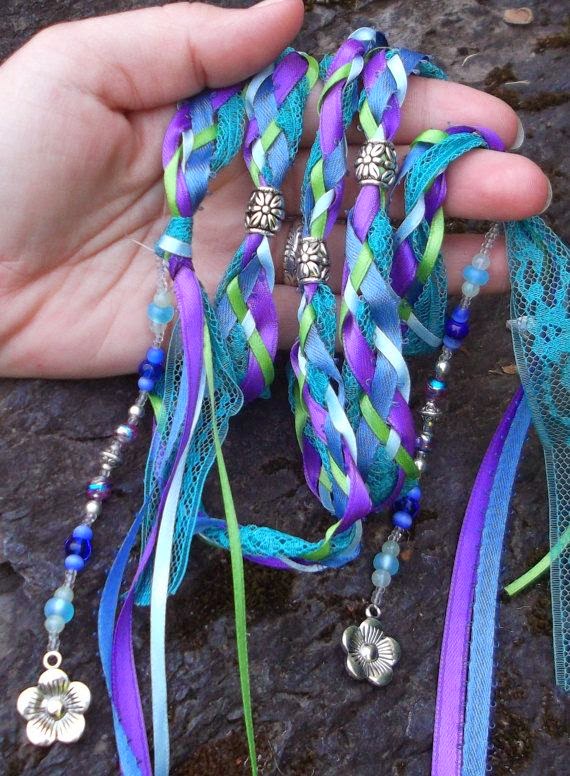Tying the Knot
Handfasting
Ceremonies for Modern Couples
The modern expressions, "tying the
knot," "bonds of matrimony" and "hand in marriage" all
hail from many ancient traditions such as the
Mayans of South America to the Hindu Vedic community of the Middle East to the
Celtic culture of Scotland, tying of the hands is one of the oldest matrimonial
traditions.
Although there are countless variations on the
practice, the symbolic act typically involves fastening a couple's hands
together with cording, ribbon, twine or a silk sash, prayers may be recited,
readings or the couple can say their vows while fastened together.
Whereas this practice stems from so many
cultures there are equally as many ways to perform the ceremony. The
versatility of the ritual is easily adaptable to ceremonies of any faith.
There is nothing more delightful then to be
able to offer couples so many ways to make this ceremony personally theirs
alone.
A couple can not only choose the words in the
ceremony but the style, colours & decorations of cord and the material used
to create it.
Numerous online wedding vendors sell ready-made
and custom versions.
Generally four to six feet in length, the
threads can consist of any color or material and may contain specific charms,
bells, gemstones or keepsake tokens attached to bless to marriage.
Couples often chose to create their own cord
feeling that it adds a special love from each of them. Other options are
including children, family and friends to add their love as well.
The wording style of the ritual can be written
to fit the bride and groom’s lifestyles, faith and expression of love that is
unique only to them.
Types of
Handfasting Ceremonies
Christian
·
A
handfasting ceremony represents everything that a Christian marriage is based
on. The rope itself can even serve as a reference to Ecclesiastes 4:12 and
your marriage to your fiancé also being a marriage involving God. “A person
standing alone can be attacked and defeated, but two can stand back-to-back and
conquer. Three are even better, for a triple-braided cord is not easily
broken.”
Secular or Non-Religious
The love already shared by your hearts
has been strengthened by the vows you have taken
you will be bound by your love as you are bound by your clasped hands
from now until the end of your days
has been strengthened by the vows you have taken
you will be bound by your love as you are bound by your clasped hands
from now until the end of your days
New Age – Celtic, Buddhist, South Asian, Hindu
Vedic
Handfasting ceremonies can vary for the culture
it embraces.
I am happy to discuss and research the
Handfasting ceremony that encompasses everything your beliefs require.
There are even many options with the design of
the knot to be tied around the couple’s hands.
·
Fisherman's Knot
Also known as a true lovers knot, the fisherman’s knot forms one of the most durable bonds. The binding consists of two interlocking, overhand knots that create a symmetrical figure eight. The simple knot strengthens under pressure and becomes sturdier when it gets wet.
Also known as a true lovers knot, the fisherman’s knot forms one of the most durable bonds. The binding consists of two interlocking, overhand knots that create a symmetrical figure eight. The simple knot strengthens under pressure and becomes sturdier when it gets wet.
·
God’s Knot
The God's Knot consist of three cords to represent the spiritual union of a husband and wife and their covenant relationship with God. During the ceremony, the couple work together to braid the three cords -- purple for the groom, white for the bride and gold for God.
The God's Knot consist of three cords to represent the spiritual union of a husband and wife and their covenant relationship with God. During the ceremony, the couple work together to braid the three cords -- purple for the groom, white for the bride and gold for God.
Infinity Knot
According to GaiasHandfasting.com, the recipient of the 2011 and 2012 Bride’s Choice Award, Wiccan couples form the infinity symbol by crossing their arms and joining their hands, creating a figure eight. The officiant then wraps the ribbon around the couple's hands three times. While most couples choose to release the binding before the ceremony ends, some opt to wear it throughout the reception until they are able to consummate the marriage.
Mystic Knot
Among feng shui practitioners, the infinity-shaped mystic knot is believed to bless a marriage with good luck, harmony and longevity. Considered an auspicious object, the ribbon is wrapped around the couple's hands six times creating a seamless, never ending binding to symbolize the endless cycles of birth and rebirth.
Trinity Knot
The triquetra is most commonly seen in Irish wedding ceremonies. Historians estimate that the ancient Celtic symbol dates back to 600 AD. Among pagan followers, the three points represent the mother, maiden and crone, while Christians use the well-known symbol to signify the Father, Son and Holy Spirit.
If you
feel this Unity Ceremony rings true in your heart please contact me for the
numerous possibilities of how to incorporate it into your wedding ceremony.
919-373-4267















No comments:
Post a Comment